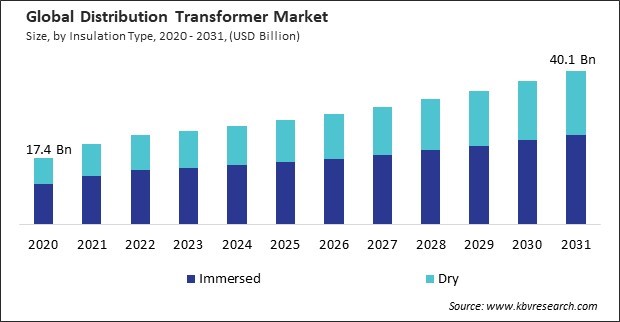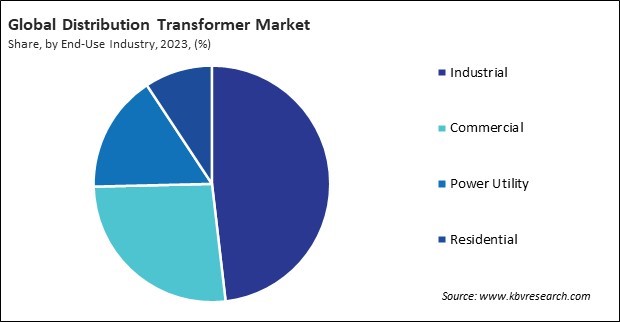“Global Distribution Transformer Market to reach a market value of USD 40.1 Billion by 2031 growing at a CAGR of 6.5%”
The Global Distribution Transformer Market size is expected to reach $40.1 billion by 2031, rising at a market growth of 6.5% CAGR during the forecast period.
North America has been investing in renewable energy projects, which drives the demand for these transformers. Consequently, the North American region would acquire nearly 28% of the total market share by 2031. With the increasing emphasis on renewable energy sources such as wind and solar, these transformers are required to integrate these intermittent energy sources into the grid.

The rapid pace of urbanization and industrialization, especially in emerging economies, significantly drives electricity demand. As populations grow and urban areas expand, there is an inherent need for more infrastructure, services, and amenities, all of which rely heavily on electricity. Moreover, these transformers serve as key components within electricity distribution networks, stepping down high-voltage electricity from transmission lines to lower-voltage levels suitable for consumption by households, businesses, and industrial facilities. Therefore, these aspects can boost the demand for these transformers in the coming years. Additionally, Wind and solar power generation are inherently variable due to fluctuations in weather conditions. These transformers play a crucial role in integrating this variable renewable energy into the grid by stepping up or down voltage levels to match the requirements of the distribution network. Furthermore, as renewable energy penetration increases, maintaining grid stability and reliability becomes more challenging due to the intermittent nature of wind and solar generation. These transformers help manage voltage fluctuations and ensure the smooth flow of electricity within the distribution network, contributing to grid stability. Therefore, these aspects can enhance demand in the market.
However, aging infrastructure may struggle to meet the increasing demands placed on the electrical grid, such as higher electricity consumption due to population growth, industrial expansion, and the electrification of new sectors like electric vehicles. Furthermore, modernizing existing electrical infrastructure often involves integrating new technologies, such as smart grid systems, renewable energy sources, and energy storage solutions, into the existing grid architecture. Therefore, these factors can lead to decreased demand for these transformers in the upcoming years.
Based on insulation type, the market is segmented into dry and immersed. The dry segment held 40% revenue share in the market in 2023. Dry-type transformers are safer than oil-filled transformers because they don’t use flammable liquids like oil. This makes them more attractive in environments where fire safety is a concern. Additionally, they eliminate the risk of oil spills, which can have significant environmental consequences.
Based on end-use industry, the market is segmented into residential, commercial, industrial, and power utility. In 2023, residential segment garnered 9% revenue share in the market. Governments and utilities are prioritizing electrification initiatives to extend access to electricity to underserved rural and urban areas. These initiatives aim to improve living standards, promote economic development, and enhance the quality of life for residents. These transformers play a crucial role in electrification efforts by decreasing voltage from transmission lines to levels suitable for residential consumption.

On the basis of product type, the market is divided into pad mounted, pole mounted, and underground vault. In 2023, the pole mounted segment witnessed a 30% revenue share in the market. Pole-mounted transformers are well-suited for densely populated urban environments where space constraints or accessibility issues may limit the installation of larger substations or underground infrastructure. As cities expand and electrification rates rise, the deployment of pole-mounted transformers becomes essential to meet growing electricity demand.
On the basis of power rating, the market is divided into upto 500 kVA, 501 kVA to 2500 kVA, 2501 kVA to 10000 kVA, and more than 10,000 kVA. In 2023, the 501 kVA to 2500 kVA segment witnessed 22% revenue share in the market. As industries and urban areas expand, there is a growing electricity demand. This drives the need for these transformers from 501 kVA to 2500 kVA to efficiently distribute power within the grid. Developing countries, in particular, are investing in infrastructure projects, including power distribution networks.
Based on phase type, the market is bifurcated into single phase and three phase. In 2023, the single phase segment witnessed 33% revenue share in the market. Single-phase transformers are commonly used in residential and small commercial applications where the power demand is relatively lower compared to larger industrial or commercial settings. With the expansion of urban and peri-urban areas, there has been a growing need for these transformers to serve residential complexes, apartment buildings, and small businesses.
Free Valuable Insights: Global Distribution Transformer Market size to reach USD 40.1 Billion by 2031
By region, the market is segmented into North America, Europe, Asia Pacific, and LAMEA. The Asia Pacific segment procured 36% revenue share in the market in 2023. Many countries in the Asia Pacific region are undergoing rapid urbanization, leading to the construction of residential and commercial buildings and increasing the demand for electricity distribution infrastructure. The region is experiencing significant industrial growth, particularly in the manufacturing, automotive, and electronics sectors.
| Report Attribute | Details |
|---|---|
| Market size value in 2023 | USD 24.5 Billion |
| Market size forecast in 2031 | USD 40.1 Billion |
| Base Year | 2023 |
| Historical Period | 2020 to 2022 |
| Forecast Period | 2024 to 2031 |
| Revenue Growth Rate | CAGR of 6.5% from 2024 to 2031 |
| Number of Pages | 345 |
| Number of Tables | 530 |
| Report coverage | Market Trends, Revenue Estimation and Forecast, Segmentation Analysis, Regional and Country Breakdown, Porter’s 5 Forces Analysis, Company Profiling, Companies Strategic Developments, SWOT Analysis, Winning Imperatives |
| Segments covered | Insulation Type, Product Type, Power Rating, Phase Type, End-Use Industry, Region |
| Country scope |
|
| Companies Included | Fuji Electric Co. Ltd., General Electric Company, ABB Ltd., Eaton Corporation PLC, Toshiba Corporation, Schneider Electric SE, Siemens AG, Mitsubishi Electric Corporation, Kirloskar Electric Co. Ltd. and Bharat Heavy Electricals Ltd. |
By Insulation Type
By End-Use Industry
By Product Type
By Power Rating
By Phase Type
By Geography
This Market size is expected to reach $40.1 billion by 2031.
Rapid urbanization and industrialization in various nations are driving the Market in coming years, however, Limited modernization initiatives of existing electrical infrastructure restraints the growth of the Market.
Fuji Electric Co. Ltd., General Electric Company, ABB Ltd., Eaton Corporation PLC, Toshiba Corporation, Schneider Electric SE, Siemens AG, Mitsubishi Electric Corporation, Kirloskar Electric Co. Ltd. and Bharat Heavy Electricals Ltd.
The expected CAGR of this Market is 6.5% from 2023 to 2031.
The Industrial segment is generating the highest revenue in the Market by End-Use Industry in 2023; thereby, achieving a market value of $18.5 billion by 2031.
The Asia Pacific region dominated the Market by Region in 2023, and would continue to be a dominant market till 2031; thereby, achieving a market value of $15 billion by 2031.
Our team of dedicated experts can provide you with attractive expansion opportunities for your business.

 Drivers
Drivers
 Restraints
Restraints
 Opportunities
Opportunities
 Challenges
Challenges
